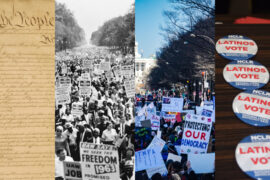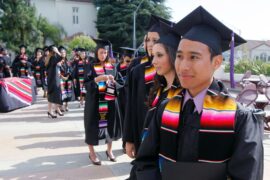
Most Latinos — 70%, according to a Pew Research Center survey — now plan to get the coronavirus vaccine, or have already received it. That marks a significant turnaround from earlier this year when vaccine hesitancy posed a major challenge in combating COVID-19. While progress has been made, health experts and community advocates admit obstacles remain to getting Latinos vaccinated.
To date, roughly 32% of the total U.S. population has been fully vaccinated; 45% have received at least one dose of the vaccine. The Centers for Disease Control and Prevention says the race and ethnicity is known for just over half of all individuals who have gotten their shot. Among that group, 13% are Latino. Hispanics make up 18.5% of the country’s population, and are getting vaccinated at disproportionately lower rates than white people.
Outreach efforts at Esperanza, a mass clinic in Philadelphia, have been successful. So far, 56% of vaccinations administered there have gone to Hispanics, who make up about a third of the nearby population.
In Washington, D.C., barber shops and hair salons in communities of color are doing their part to encourage patrons to get vaccinated. One shop prominently displays vaccine information so customers can see it. The shop also prompts clients to ask COVID-related questions while they get their hair cut.
A small group of volunteers in San Jose, California is helping Latino essential workers make vaccine appointments. So far, the five so-called “equity fairies” have made close to 300 appointments for people who have had trouble navigating the system. And in San Diego, activists from communities of color are calling people to talk about the vaccine.

Meanwhile, a professor at Arizona State University recently set up a website to debunk vaccine myths. Gilberto Lopez created CovidLatino.org after finding that Latinos living in rural areas were less likely to get vaccinated than those in metropolitan regions.
Despite the progress and efforts to get Latinos vaccinated, challenges persist. “Vaccine hesitancy remains an issue, but the reality is that access is an even bigger problem,” said Illinois Rep. Jesús “Chuy” García. “We need to meet people where they are and bring vaccines to those who need it the most.”
The Kaiser Family Foundation reports that white people are vaccinated at 1.5 times the rate of Latinos. In Colorado, for example, just 10% of vaccinations have gone to Latinos. Hispanics there make up 41% of coronavirus cases, 25% of COVID-related deaths, and are 22% of the population. That trend can be seen in just about every state.
“We know there are many factors that contributed to this, including access and connection with primary care and providers,” said Brandy Emily, Colorado’s deputy director of immunization.

To combat issues of access, health advocacy groups across the country have implemented mobile pop-up clinics to reach more people in communities of color. Many vaccine sites also now offer walk-in appointments without online hassle. Outreach workers are getting out the word that health insurance is not required for the vaccine; neither is information about one’s immigration status. Some states have also set up vaccination sites near where Latinos work for those who have trouble with transportation or getting time off.
Vaccinations are down 42% from their pinnacle a month ago. Kaiser says the country is now at the point where everyone who wants the vaccine has already received their first dose — it’s now a matter of shifting strategies.
An estimated 80% of people in the U.S. live within five miles of all three coronavirus vaccines. To find a vaccine site, visit vaccines.gov.




